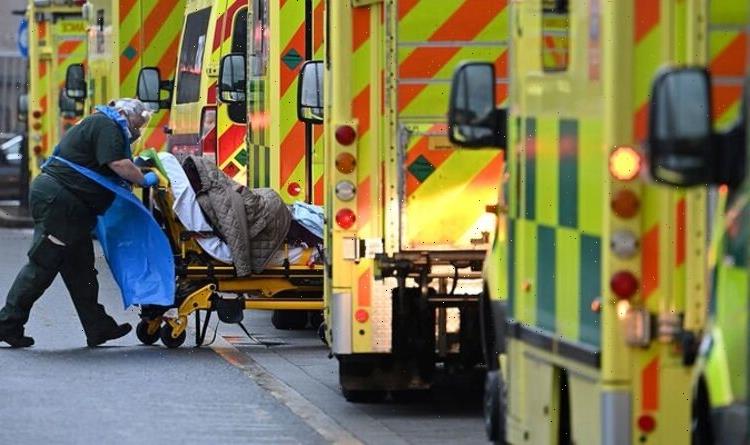Omicron: GP explains ‘overwhelming’ science behind vaccines
We use your sign-up to provide content in ways you’ve consented to and to improve our understanding of you. This may include adverts from us and 3rd parties based on our understanding. You can unsubscribe at any time. More info
The five-year average for deaths in England and Wales for the first four weeks of the year is 55,130, but this year 50,740 deaths were registered. That’s a drop of 4,390. And for Britain as a whole, there were 4,894 fewer deaths recorded compared to the five previous years.
The figures were released by the Office for National Statistics (ONS), who removed 2020 from its figures.
But there would still be a drop in the numbers if it was included, with 1,310 less.
The figures for the week ending January 28 also show that the number of deaths where COVID-19 is the primary cause is falling.
It is now said to be linked to 71.2 percent of registered virus deaths, compared to 72.9 percent the previous week.


Paul Hunter, a professor in medicine at the University of East Anglia, said: “We now have ONS-reported deaths data for the first four weeks of 2022, and there are some interesting observations.
“Firstly, total deaths from all causes are lower than the average for 2015 to 2019, so we are not seeing more deaths so far this year than we would expect for this month in the years before Covid.
“And, in an increasing proportion of deaths within 28 days of a positive Covid test, the certifying doctor has not considered Covid to have contributed to the cause of death.
“These figures are based on date reported, not date of death, so will be less biased by time to report delays that can affect recent data based on date of death.”

And Dr Raghib Ali, from the University of Cambridge’s MRC epidemiology unit, said it is “now clear” that deaths peaked at around 200 a day.
Dr Ali said there had been no excess deaths seen with the omicron variant, unlike previous strains.
It comes after the Government lifted its Plan B measures, with mandatory face coverings in public places and Covid passports both dropped.
Prime Minister Boris Johnson said England was reverting to “Plan A” due to boosters and how people had followed Plan B measures.
DON’T MISS
Macron bites back with £850m fund after UK announces masterplan [REVEAL]
Boris Johnson’s green nuclear revolution falling apart [INSIGHT]
History of Scotland ‘needs rewriting’ after bombshell colonial find [REPORT]


He told MPs scientists believed the Omicron wave had peaked nationally.
At a Downing Street press conference, Health Secretary Sajid Javid said: “This is a moment we can all be proud of.
“It’s a reminder of what this country can accomplish when we all work together.”
But, he said, this should not be seen as the “finish line” because the virus and future variants cannot be eradicated – instead “we must learn to live with Covid in the same way we live with flu”.
Source: Read Full Article
